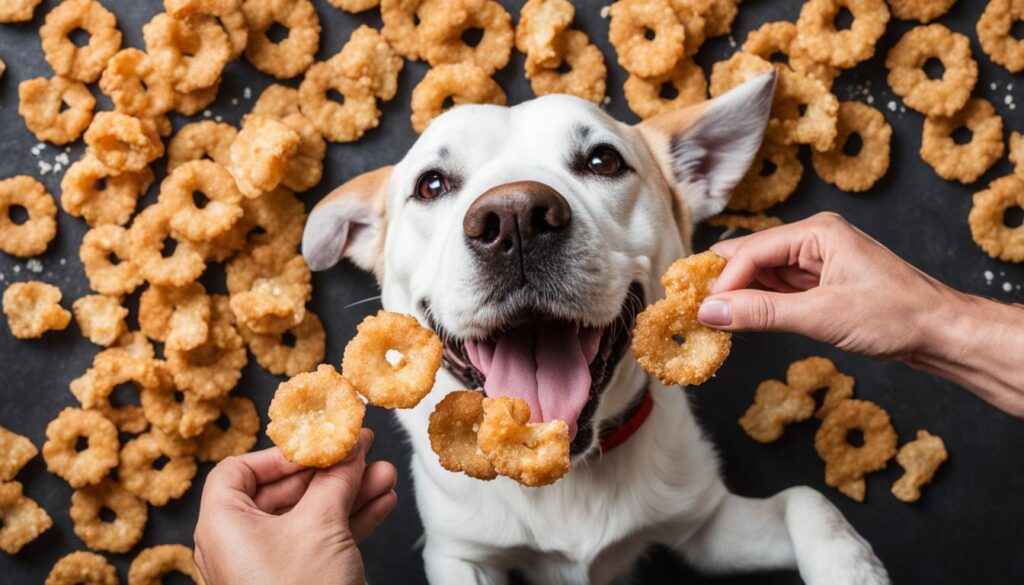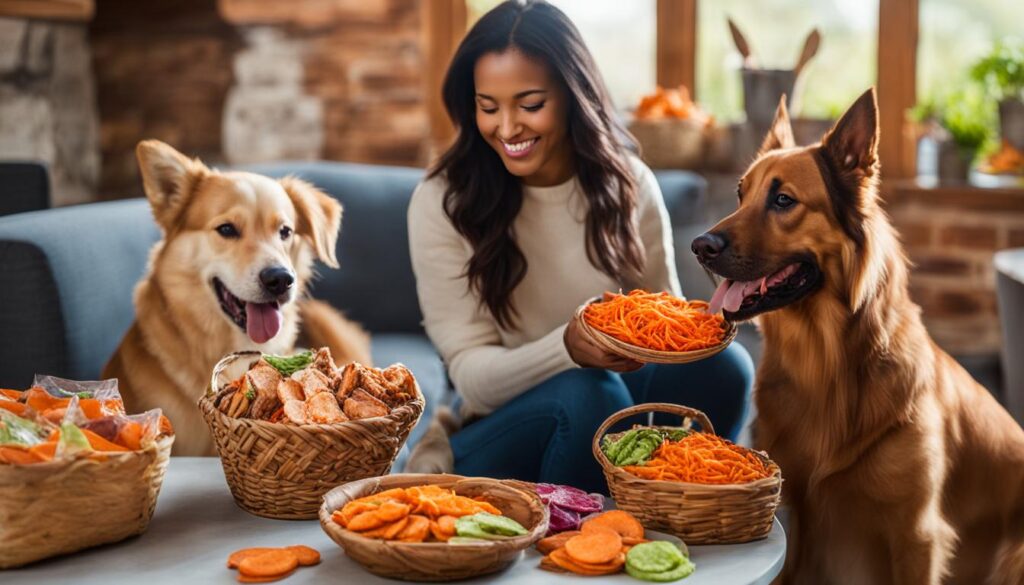Should Your Dog Be Eating Pork Rinds?
Pork rinds are a popular snack for humans, but can dogs safely eat them? It’s important to consider the potential risks before giving your dog pork rinds as a treat. While it may be tempting to share your snack with your furry friend, it’s best to understand why pork rinds are not recommended for dogs.
Key Takeaways:
- Pork rinds are not recommended for dogs due to their high salt and fat content.
- Feeding your dog pork rinds can lead to health issues such as salt poisoning, obesity, and pancreatitis.
- Some flavors and seasonings in pork rinds can be toxic to dogs.
- Choose alternative treats that are safe and healthier for your dog.
- Consult with your veterinarian for personalized advice on your dog’s diet.
What Are Pork Rinds?
Pork rinds are a popular snack made from deep-fried pork skin. They are often seasoned with flavors such as salt, pepper, cinnamon, sugar, or barbecue. While pork rinds can be a tasty treat for humans, it’s important to understand their impact on your dog’s health.
Although pork rinds contain some protein, they are also high in fat and sodium. While fat is an essential part of a dog’s diet, excessive fat intake can lead to obesity and other health issues. Additionally, the high sodium content in pork rinds can be harmful to your dog’s cardiovascular health.
It’s worth noting that there are no specific health benefits of pork rinds for dogs. While they may provide a satisfying crunch, there are alternative treats that can offer more nutritional value and health benefits for your furry friend.

Pork Rinds Nutritional Information
| Nutrient | Amount per 1 oz (28g) |
|---|---|
| Calories | 154 |
| Total Fat | 9g |
| Saturated Fat | 3g |
| Protein | 16g |
| Sodium | 546mg |
| Carbohydrates | 0g |
Source: USDA National Nutrient Database
Why Pork Rinds Are Bad for Dogs
Feeding your dog pork rinds may seem like a harmless treat, but there are several reasons why it’s not recommended. Let’s explore the potential risks of feeding your furry friend pork rinds and discuss alternative options that are safer and healthier.
High Sodium Content
One of the primary concerns with pork rinds is their high salt content. Dogs have much lower salt requirements compared to humans, and excessive salt intake can lead to salt poisoning. Symptoms of salt poisoning in dogs include diarrhea, vomiting, increased thirst, excessive urination, and even kidney problems.
High Fat Content
Pork rinds are also rich in fat, which can be detrimental to your dog’s health. Consuming high-fat foods regularly can contribute to obesity, which increases the risk of various health issues in dogs, including heart disease, joint problems, and diabetes. Furthermore, the high fat content in pork rinds can potentially lead to pancreatitis, a painful inflammation of the pancreas.
Toxic Flavors and Seasonings
Some flavors and seasonings used in pork rinds can be toxic to dogs. Spicy or onion seasonings, for example, can cause gastrointestinal upset, stomach pain, and even poisoning. It’s important to remember that dogs have different sensitivities to certain foods compared to humans, and what may seem harmless to us can be harmful to them.
To ensure the well-being of your dog, it’s best to avoid feeding them pork rinds altogether. Instead, consider alternative treats that are both safe and healthier for your furry friend. Let’s take a look at some options:
- Dehydrated pork products such as dehydrated pork hearts or pork thins can provide a similar crunch and taste without the unhealthy additives. These treats are made specifically for dogs and offer a protein-rich snack that cats and dogs will enjoy.
- Vegetables and fruits such as carrots, green beans, and apple slices can be excellent alternatives to pork rinds. They are low in calories, rich in nutrients, and provide a satisfying crunch.
- Commercially-available dog treats that are specifically formulated to meet your dog’s nutritional needs are also a great option. Look for treats that contain high-quality ingredients and avoid those with excessive salt, fat, or artificial additives.

By choosing alternative treats that are safe and nutritionally balanced, you can provide your dog with a tasty reward without exposing them to the potential risks associated with pork rinds.
Pork Rind Alternatives for Your Pup
If you’re looking for alternatives to pork rinds as treats for your furry friend, there are plenty of options available that are both delicious and healthier for dogs. It’s important to choose treats that are specifically made for dogs and consider their nutritional needs. Here are some fantastic alternatives to pork rinds that your pup will love:
Dehydrated Pork Hearts
Dehydrated pork hearts are a great alternative to pork rinds. They provide a similar crunch and taste without the unhealthy additives. These treats are high in protein and low in fat, making them a nutritious option for your dog.
Pork Thins
Another alternative is pork thins. These thinly sliced pieces of pork are dehydrated to maintain their natural flavors. They offer a satisfying crunch and are a great source of protein for your dog. Pork thins are a healthier alternative to pork rinds and are free from unnecessary seasonings or additives.
When introducing new treats to your dog’s diet, it’s essential to do so gradually. Start with small portions and monitor your dog’s reaction. If any negative symptoms or allergies occur, discontinue use and consult your veterinarian.

By choosing these pork rind alternatives, you can provide your dog with a tasty and safe treat option. Remember to always prioritize your dog’s health and well-being when selecting treats.
The Risks of Giving Your Dog Pork Rinds
Feeding your dog pork rinds on a consistent basis or in large quantities can pose significant risks to their health. The high sodium content can lead to salt poisoning and the high fat content can contribute to obesity, pancreatitis, and other health issues. Additionally, some flavors and seasonings used in pork rinds can be toxic to dogs. It’s important to be aware of these risks and avoid giving your dog pork rinds to ensure their well-being.
| Safety Risks of Dogs Consuming Pork Rinds | Health Risks of Pork Rinds for Dogs |
|---|---|
| High sodium content can lead to salt poisoning | High fat content can contribute to obesity |
| Flavors and seasonings used can be toxic to dogs | Increased risk of pancreatitis |
To further emphasize the risks, let’s take a closer look at the potential health issues that can arise from dogs consuming pork rinds:
“The high sodium content in pork rinds can lead to salt poisoning in dogs. Dogs are more sensitive to sodium, and excessive intake can cause symptoms such as increased thirst, vomiting, diarrhea, seizures, and even death in severe cases.” – Dr. Sarah Johnson, DVM
Moreover, the high fat content in pork rinds can contribute to obesity in dogs, which increases the risk of various health problems including joint issues, heart disease, and diabetes. Additionally, the consumption of fatty foods like pork rinds can trigger pancreatitis, a potentially life-threatening condition characterized by inflammation of the pancreas.
The Importance of Avoiding Pork Rinds
It’s crucial to prioritize your dog’s safety and well-being by avoiding the consumption of pork rinds. The risks associated with their consumption far outweigh any potential benefits. There are various other dog-friendly and healthier treat options available that can provide the same satisfaction without posing the same health risks.
Conclusion
In conclusion, it is best to avoid feeding your dog pork rinds. While they may be a tempting snack, the risks associated with their consumption outweigh any potential benefits. The high salt and fat content, along with the potential toxicity of certain flavors and seasonings, make pork rinds unsuitable for dogs. It’s important to prioritize your dog’s health and choose alternative treats that are safe and nutritionally balanced.
Alternative Treats for Your Dog
If you’re looking for safe and healthy alternatives to pork rinds, consider the following options:
| Treat | Description |
|---|---|
| Carrot sticks | Fresh and crunchy, carrots are a low-calorie and nutritious treat for dogs. |
| Blueberries | Packed with antioxidants, blueberries make a delicious and healthy snack for dogs. |
| Pumpkin cubes | Rich in fiber and vitamins, pumpkin cubes are a great treat for digestive health. |
| Chicken jerky | High in protein and low in fat, chicken jerky is a tasty alternative to pork rinds. |
| Green beans | Crunchy and packed with nutrients, green beans are a satisfying and healthy treat. |
Remember to introduce new treats gradually and in moderation, keeping in mind your dog’s dietary needs and any specific health concerns. Consult with your veterinarian if you have any questions or concerns about your dog’s diet.
Additional Resources
If you want to learn more about the topic of dogs consuming pork rinds, there are several additional resources available. The Merck Veterinary Manual and PetMD provide valuable information on canine nutrition and potential risks associated with certain foods. It’s always best to consult with your veterinarian for personalized advice and recommendations regarding your dog’s diet.
Frequently Asked Questions (FAQ)
Q: Can dogs eat pork rinds?
A: No, it is not recommended to feed your dog pork rinds. Pork rinds are high in fat and sodium, which can be detrimental to your dog’s health. They can lead to salt poisoning, obesity, and even pancreatitis in dogs. Additionally, some flavors and seasonings used in pork rinds can be toxic to dogs. It is best to explore alternative treats that are safe and healthier for your furry friend.
Q: What are the risks of giving your dog pork rinds?
A: Feeding your dog pork rinds on a consistent basis or in large quantities can pose significant health risks. The high sodium content can lead to salt poisoning, causing diarrhea, vomiting, and kidney problems. The high fat content can contribute to obesity and increase the risk of pancreatitis. Moreover, certain flavors and seasonings used in pork rinds can be toxic to dogs. It is important to be aware of these risks and prioritize your dog’s well-being.
Q: Are there any alternatives to pork rinds for dogs?
A: Yes, there are many alternative treats that you can give to your dog instead of pork rinds. Dehydrated pork products such as dehydrated pork hearts or pork thins can provide a similar crunch and taste without the unhealthy additives. It is important to choose treats that are specifically made for dogs and consider their nutritional needs. There are plenty of options available in the market that are both delicious and healthier for your furry friend.
FAQ
Can dogs eat pork rinds?
No, it is not recommended to feed dogs pork rinds. Pork rinds are high in fat, sodium, and potentially toxic flavors and seasonings, which can be detrimental to a dog’s health.
What are the potential risks of feeding dogs pork rinds?
Feeding dogs pork rinds can increase the risk of salt poisoning, obesity, pancreatitis, and other health issues. Some flavors and seasonings used in pork rinds can also be toxic to dogs.
What are some alternatives to pork rinds for dogs?
There are plenty of healthier alternatives to pork rinds for dogs. Some options include dehydrated pork products such as dehydrated pork hearts or pork thins, which provide a similar crunch and taste without the unhealthy additives.
Can pork rinds provide any health benefits for dogs?
No, there are no specific health benefits of pork rinds for dogs. While they do contain some protein, the high fat content outweighs any potential benefits.
What are the risks of giving your dog pork rinds?
The risks of giving your dog pork rinds include salt poisoning, obesity, pancreatitis, and potential toxicity from flavors and seasonings used in pork rinds. It is best to avoid feeding them to ensure your dog’s well-being.
Are there any additional resources available on dogs consuming pork rinds?
For more information on canine nutrition and potential risks associated with certain foods, you can refer to resources such as the Merck Veterinary Manual and PetMD. It is always recommended to consult with your veterinarian for personalized advice and recommendations.


